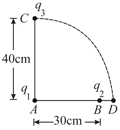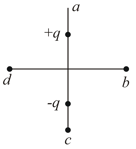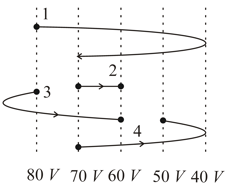Embibe Experts Solutions for Chapter: Electrostatics, Exercise 12: Exercise (Analytical Questions)
Embibe Experts Physics Solutions for Exercise - Embibe Experts Solutions for Chapter: Electrostatics, Exercise 12: Exercise (Analytical Questions)
Attempt the practice questions on Chapter 22: Electrostatics, Exercise 12: Exercise (Analytical Questions) with hints and solutions to strengthen your understanding. Beta Question Bank for Medical: Physics solutions are prepared by Experienced Embibe Experts.
Questions from Embibe Experts Solutions for Chapter: Electrostatics, Exercise 12: Exercise (Analytical Questions) with Hints & Solutions
Suppose the charge of a proton and an electron differ slightly. One of them is the other is If the net of electrostatic force and gravitational force between two hydrogen atoms placed at a distance (much greater than atomic size) apart is zero, then is of the order of (Given mass of hydrogen,
An electron falls from rest through a vertical distance in a uniform and vertically upward directed electric field . The direction of electric field is now reversed, keeping its magnitude the same. A proton is allowed to fall from rest in it through the same vertical distance . The time of fall of the electron, in comparison to the time of fall of the proton is
If a charged spherical conductor of radius has potential at a point distant from its centre, then the potential at a point distant from the centre will be
Two charges and are placed apart, as shown in the figure. A third charge is moved along the arc of a circle of radius from to . The change in the potential energy of the system is , where is:

Four points and are set at equal distance from the centre of a dipole as shown in the figure. The electrostatic potentials and would satisfy the following relation:

Figure shows a family of parallel equipotential surfaces and four paths along which an electron is made to move from one surface to another as shown.
(A) What is the direction of the electric field?
(B) Rank the paths according to work done, greatest first.

For the hollow thin cylinderical current carrying pipe which statement is correct :-
If mechanical system is taken equivalent to electrical system then displacement is analogous to
